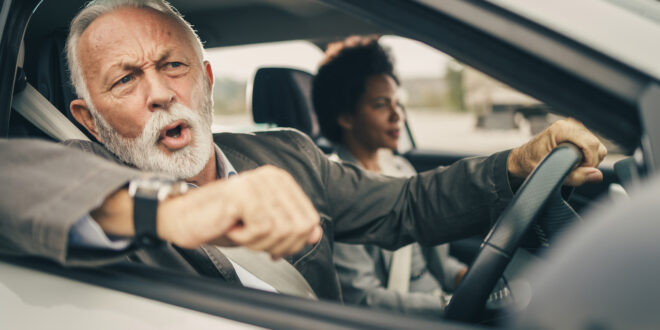It was once so rare (or at least so minor) it wasn’t even talked about, let alone given an official title – but in the 1980s this all changed, when in the United States, the term ‘road rage’ began appearing regularly in general conversation. Being at the bottom of the world has its advantages, but the term ‘road rage’ did eventually reach us ‘down-under,’ and in 1997, New Zealand’s then Transport Minister, Jenny Shipley, referenced the trend in a speech. Describing it as “a gross demonstration of a loss of individual self-control,” she told her audience road rage “cannot and should not be justified or tolerated.” Moreover, she said, “What’s being described as ‘road rage’ is simply incidents of motorists behaving aggressively or violently.”
Since then, to many of us, the term ‘road rage’ appears to ‘explain,’ at least the more minor, elements of bad driving behaviour, and to ‘categorise’ the more serious incidents. It may, in part, be due to the fact New Zealand doesn’t actually have laws addressing ‘road rage’ by this term. Instead, individual behaviours associated with road rage are addressed. These include assault and reckless damage to property, and can have very serious legal consequences. So why is it, for many, the term ‘road rage’ in some way appears to minimalise what can actually be appalling behaviour?
Perhaps, it’s because ‘road rage’ also encompasses behaviours which we are all capable of exhibiting. After all, who amongst us hasn’t shouted (if only to the interior of our vehicle) at a driver pulling out without indicating, or a tourist driver stopping without warning in the middle of a country road to take a photo? The thing is, we are all capable of ‘road rage,’ and it’s simply a case of the ‘degree,’ and how we display our frustration, that keeps us out of court!
Much research has focused on why, otherwise law abiding citizens, get so caught up in their own road rage. Part of the reason, it seems, is when we are inside a vehicle, we are locked into an individual bubble, and instead of feeling part of the general ‘traffic population,’ we behave as if we ‘own’ our own, private, space. This gives rise to a feeling of entitlement – the road becomes something belonging to us, and just like a child who won’t share their toys, we feel aggrieved when we’re told we have to!
Even when we accept we must share road space, we still become frustrated with those who don’t always share ‘correctly.’ It seems our frustrations are the same as those experienced by drivers around the world. We all become irritated by those who fail to indicate, tailgate, drive too slowly, and speed up just before passing lanes or at amber traffic lights. On the positive side, we can minimise the chance of being the target of road rage, ourselves, by doing our best to avoid the very behaviours we don’t enjoy encountering in others!
Being a considerate driver doesn’t make us immune from road rage. Sometimes we simply get things wrong (we’re human, after all, even on the road). At other times we’re doing nothing wrong, and still encounter the wrath of a driver who feels we are. In cases like this, it’s important we respond in ways that de-escalate the situation, and know what to do when road rage looks like it could turn violent.
In the first instance, don’t engage or make eye contact with your aggressor, and chances are, the moment will ‘blow over.’ If things don’t disappear by themselves, try mouthing a quick ‘sorry’ or open your hands in front of you in apology if you were in the wrong (or even if you weren’t). You may need to do this several times before things cool down. As soon as possible, let the frustrated driver pass you, so they can go on their way. If the situation does escalate, keep your doors locked and your windows closed, and don’t pull over or stop on the road. If it seems you’re being further harassed or followed, head to a public space (such as a petrol station) where others can see what’s happening. If you’re not far from a police station, head for it (just be aware in rural situations, a police station may not be staffed in person).
Encountering road rage or the poor driving behaviour of others, can leave you feeling upset or in a state of panic. When it’s safe to do so, take time out from your journey to catch your breath and refocus. Remind yourself you’re doing your best, so are most other drivers, and mistakes and misunderstandings happen. It’s all part of using the road together!









Join the Discussion
Type out your comment here:
You must be logged in to post a comment.